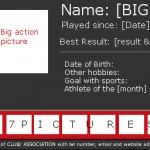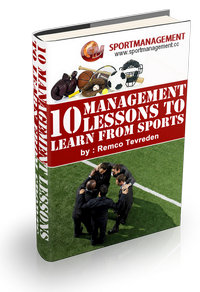7 steps to get sponsors while you promote your athletes
The main reason why sport organizations exist SHOULD be to facilitate the athletes. I am sure that many sport administrators do not live by it, but each and everything you do, should in the long run benefit your athletes.
You may recognize this situation: One of your athletes is always coming to the training sessions, trains dedicated and just shows so much talent and focus that you know he/she is going to make it………as long as there is enough money invested in him/her. The parents may or may not be so supporting, and perhaps they don’t even have the funds to send their kid to a regional competition, or perhaps an international one. So you know that if you don’t step up, and get some good sponsoring, another talent goes wasted.
I know many examples of board members doing their utmost to get sponsors. They write letters, make numerous phone calls, and have meetings….but for some reasons the result is minimal.
Athletes do not need many words to make their passion clear
I always advise sport organizations to make use of their athletes. Athletes do not need many words to make their passion and message clear. If you talk to an athlete who really is passionate about their sports, you just feel it from their expression, the way their face lightens up when they talk about their competitions, wins or losses.
If you have never been an athlete it is just impossible to give this additional touch to the conversation with any potential sponsor. And it is just this emotion that can push the manager/director of the company in the right direction to make the decision.
So what should you do?
1. SELECT YOUR ATHLETE(S)
First, you should realize that you don’t need to have world athletes in your organization, to approach sponsors. It is all about showing potential sponsors that you deserve to have their trust, that your sportorganization is a serious one, and focused on your athletes. Neither should you focus on your best athletes in the field, as these may not be so strong communication wise. Look at your group athletes, and choose 1 or 2 athletes who are (1) dedicated to their training and (2) have some sort of a leadership position in the group. These athletes have the natural tendency already to speak up in a group, and these are exactly the ones that can help you.
2. Start your PUBLIC RELATIONS
Can you imagine yourself entering a bar/church/birthday party, and then handing out to everybody letters asking them for financial contributions or sponsoring. If nobody knows you, how do you think they would react……?
Exactly, 50% of them would not even open your envelop, 25% would throw away the letter after reading the first paragraph, and the other 25% wants to stay polite and says something like “don’t call us, we will call you”.
Do you think they would react differently if they already know your face, have read something about your sports or your athletes?
So before you approach sponsors, your efforts should be directed in introducing yourself, your sports organization and your athletes. You can do this either trough free publicity or paid publicity.
3. Build your database for FREE PUBLICITY
*I will only focus on free publicity, as the strategy for paid publicity is not always feasible for small sport organizations.
Instead of focusing on the internet and social media, my advice is to stick to the traditional media for free publicity. Everybody is on the internet, and it is very difficult to get noticed online if you don’t have a budget. So just open go to the nearest bookstore, and if you don’t know already, write down the names of newspapers that are published both in the Morning AND the Evening. On the websites of these newspapers you can look for email addresses, and collect them in a spreadsheet. You can do the same for Radio and Television stations. Many people leave it by this.
But there are more publications and media channels that can be of added value.
Do you know of any free newspapers that perhaps only focus on real estate or classifieds? There should also be free magazines about music, or perhaps in other languages.
Another approach is to target people who write or produce in media. I am talking about journalist, Tv hosts etcetera. These people are often freelancers, working for different media. So try to also get their email address for your database.
Your aim should be to get a big database, with correct email addresses. Do not underestimate the amount of time that goes into this, it is quite a lot. But if your database stays accurate, you will really feel the benefit of this. You can make a group of all the email addresses in your favorite email system like outlook, hotmail, gmail or yahoo.
4. SEND YOUR PRESS RELEASES
There are whole studies dedicated to communication with the press. But I want to keep it simple, and therefore will just talk about a way how to start building your brand, by getting your sports in the press. You can choose to write long press releases about the different activities, but you will realize that this is very time consuming. And if you don’t have the time or the motivation to write, this will very quickly become your bottle neck.
So start with sending press releases about:
- Competitions schedules, and results
- About your athletes
I am sure that most of the sport organizations already cover the first one. But how many organizations inform the press about athletes who are excelling in other areas than the competition?
You can make resumes about your athletes and make them athlete of the month. Did you ever went to a fast-food restaurant where you see the picture of the employee of the month ? Let’s just copy that ![]()
By starting your project “Athlete of the Month”, I can already mention 3 wins:
- Other sport organizations most likely do not do this, so you are being innovative and your chances of getting published in the press are getting higher
- Athletes feel very proud for being selected, and automatically there is an internal competition created on perhaps a more social level. You need of course to communicate the rules for this project very good, preferably on paper. Parents will also fee immensely proud of having their daughter or son in the press.
- Companies know the project “Employee of the Month” already, and now they read about this same project being implemented by your sport organizations…..they will remember that!

Follow the publications of your press releases closely! Make scans of the written publications, and notice which editors are giving attention to you.
5. TRAIN YOUR ATHLETES
When athletes reach a certain level, they automatically get introduced to some sort of a media training. They learn how to answer questions, that they don’t immediately know the answer to. How to communicate losses of a game and how to behave when a camera and light bulb is pointed to you.
Your goal should be to pick one athlete to accompany you to meetings with potential sponsors. Or they can even make phone calls for you, to follow up on letters sent previously.
Now don’t think that athletes exactly know what to do. They may even not like doing it. So you will need to train and coach them, and point out that they have that extra value that will benefit the team!
Train your athlete, as though they are going to a job interview. There is no doubt if they will get questions, so they better be good prepared to rehearse some answers.
- Why do you like your sport?
- What is the most difficult aspect in your sport?
- What do you want to achieve with your sport?
The trick is not to just give a plain answer, but to answer the question in such a way that your athlete ends with the fact that your organization would really appreciate any support given.
6. CV/ Resume
Like I mentioned in the point before, you should treat the sponsorship meeting, as an interview for a job. And an important part of that is a resume….not yours (as a sport administrator), not the history of your organization but a resume of your Athlete.
It will be your Athlete’s business card, and this will once again make an impression on the company.
Instead of writing about how I think such a CV should look like, I am hereby giving you a template, free for you to use.
**Hey, you can even outsource the production of such a design for $5 on www.fiverr.com
7. TARGET YOUR SPONSORS
Let’s face it, everybody in sports go after the “Big FOUR”: the Banks, the Insurance Companies, the sport Drinks and the Telecommunication companies.
Now if you open the Yellow Pages, I am sure that you see many other categories of companies. I urge you to also target those, when you mail out your sponsorship requests. For the following reasons:
- You compete directly with all other sport organizations when you approach sponsors. So you need to have a unique strategy and definitely don’t do what 95% already is doing. Additionally you should be aware that organizations of Art, Culture and Music most probably also are sending sponsorship requests to the same Big FOUR.
- I personally think it is better to have 3 medium sized sponsors, than one big one. The impact of losing one sponsor is not so big, and the future income stream is more secure.
- It is easier to build a relationship with the decision makers of small/medium sized companies. And it is exactly this relationship that will influence the long term sponsorship possibilities.
So I suggest to approach the “Big FOUR” but also other areas like:
- Bakeries
- Bars
- Taxi companies
- Dentists
- Shopping Malls
- Newspapers (!)
- Veterinarians
So there you go…..seven ways to get sponsors while you promote your athletes. Do you have any steps to add, do you agree ….or not?
Please share your opinion in the comments below!
|
Like what you read?
If so, please join our sports community who receive exclusive Sport Management tips, and get a FREE COPY of my eBook, "10 Management Lessons to Learn from Sports"!
Just enter your name and email below:
|

|




Remco: I think your 7 steps offer a good, basic foundation for folks to consider when embarking on a career working with athletes. They will have a lot of work to do moving forward, but you have given them a starting point.
Thanks Connie, there is indeed so much to do. Best thing is to start with the fundamentals
Great stuff. Thanks.
Awesome Remco.. You always give me what i want. Very much in detail.
I am doing the same stuff on adhoc way, now i can structure it.
Thanks..
Naveen
Naveen, don’t hesitate to contact me if you want more information. Or just to brainstorm